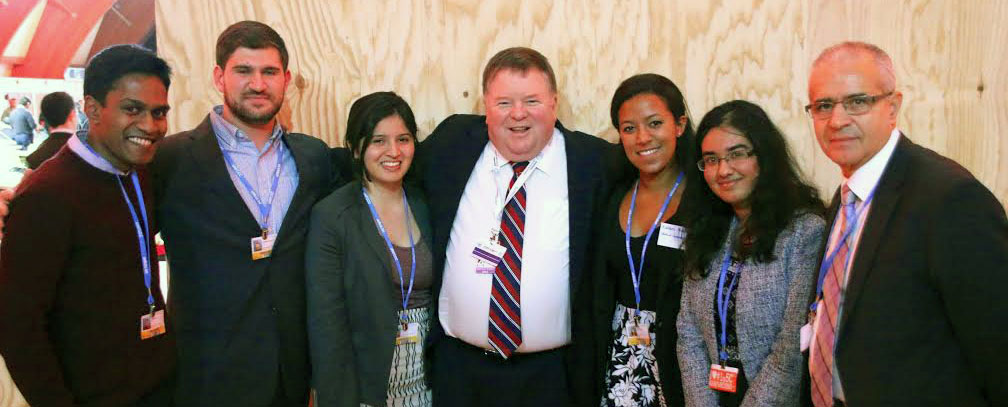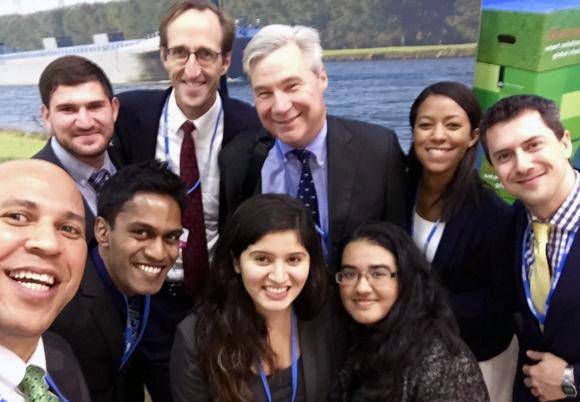PROVIDENCE, R.I. [Brown University] — Earlier this month, Brown’s Climate and Development Lab sent 16 students to Paris to take part in the United Nations Framework Convention on Climate Change 21st Conference of the Parties (COP21), which took place from Nov. 30 to Dec. 11, 2015. With delegates from 190 countries, NGOs, civil society groups and world leaders in attendance, COP21’s goal was to achieve a legally binding and universal agreement on climate, with the aim of keeping global warming below 2°C. The Brown students who attended had the opportunity to conduct research and assist various global organizations during the conference. Here, they share some highlights from the trip.
Sujay Natson ’16
Concentration: Political Science and Geology
What did you do at the talks?
I was working with the Union of Concerned Scientists (UCS), World Wildlife Fund (WWF), and Climate Home in addition to attending the negotiations that were happening. For UCS, I carried out research on the negotiating draft texts. For WWF, I was embedded in their forests team that worked to ensure the importance of forests in the final climate agreement. With Climate Home, I was photographing events and people for use on their news website.
What was a highlight of the talks for you?
Not just to observe the negotiations in person but also to be engaged with them through the work I did. I’ve been studying about the Conference of Parties (COP) and United Nations Framework Convention on Climate Change (UNFCCC) process for much of the semester through many of my classes but it was just amazing to see it live in person. It was quite rewarding to hear that some of the research I did became useful advice to negotiators.
What is one thing you learned that surprised you?
The amount of inequality that existed among the different country delegates. It wasn’t so much a surprise that it existed but more the extent to which it did. It was pretty obvious that poor developing countries, especially those in the Least Developed Countries (LDC) group, had limited resources with which to maximize their impact and lost out to the big players. Poorer countries did not have the financial resources to send more country negotiators or supporters who could then take part in the numerous negotiations and create more of a significant impact.
What new knowledge will you integrate into your studies/research at Brown?
My interests in both the sciences and politics conveniently converge in the area of climate change. For a number of my classes this semester, I’m doing research on the effectiveness of the climate change regime, its inadequacies and how it could potentially be improved. The insights I’ve gained from my experience have provided me with a new, informed lens with which to view and address the issue. Personally, it has added a sense of urgency to understand the science behind the problem and the politics of the solution.

Olivia Santiago was a delegate for the Republic of Seychelles.
Olivia Santiago ’16
Concentration: Environmental Sciences
What did you do at the talks?
At the UNFCCC, I was wearing multiple hats. I served as a delegate for the Republic of Seychelles, providing technical and advisory support to the ambassador of the Seychelles, Ronald Jumeau. Second, I was part of a team of fellows from the Yale School of Forestry that provided media coverage and coordinated several events for the Global Island Partnership. Lastly, I was researching for and promoting Hawai’i as a Pacific Island leader in the subnational implementation of sustainable development goals via the Hawai’i Green Growth Initiative.
What was a highlight of the talks for you?
The highlight of the talks for me was Ambassador Jumeau giving me special accreditation from Seychelles to watch in person the opening ceremony speeches of Obama, Merkel, Jinping, Hollande, and Putin, among a suite of other presidents, prime ministers, monarchs, and other leaders.
What is one thing you learned that surprised you?
That there is little overlap and discussion about the implementation of the 2030 Sustainable Development Goal (SDGs) agenda occurring at the Climate Convention. The SDGs work in tandem with climate change adaptation initiatives, and I was surprised by the lack of transparency between the two simultaneously occurring processes.
What new knowledge will you integrate into your studies/research at Brown?
The information I learned at the COP will help further guide my report for the Hawai’i Green Growth Initiative. I am conducting a practicum for Hawai’i Green Growth that will better position Hawai’i as an island leader in various international forums.
Kailani Acosta ’16
Concentration: Environmental Science
What did you do at the talks?
I was focusing on doing research for the 1.5°C movement, led by the Climate Vulnerable Forum. I wanted to learn more about how the most vulnerable countries were fighting for their needs in the negotiations. I worked with Dr. Saleemul Huq, a climate expert from Bangladesh with the Least Developed Countries and with another organization on Pacific Islands and conservation.
What was a highlight of the talks for you?
We have been learning about these negotiations and ideas in my classes for years, and being a part of it and seeing it all happen around me was priceless. I enjoyed meeting people in different fields from different parts of the world who brought a lot of new perspectives to the table.
What is one thing you learned that surprised you?
I never thought concretely about how difficult it is to reach an agreement with 195 countries, each with different governments, ideas, needs, and geographic locations. Countries have to go through so many steps to agree on a position themselves, then must coordinate with other countries in order to get anything accomplished. It’s a long, difficult process made even longer with inevitable disagreements and contention.
What new knowledge will you integrate into your studies/research at Brown?
The insight I gained at the conference is invaluable and will definitely integrate into my research with the Climate and Development Lab as well as in other courses I will take next semester. It was an incredible experience that will continue to influence both my academic and professional endeavors.
Mili Mitra ’18
Concentration: Public Policy and Economics (intended)
What did you do at the talks?
I was doing my own research project for class on India’s position at the negotiations, and I also worked with the Finance Working Group of Climate Action Network (CAN), providing logistical and note-taking support. I also helped out the Center for Science and Environment, an Indian research and advocacy organization.
What was a highlight of the talks for you?
I think one great moment was having the opportunity to speak with the co-chairs of the ADP (Ad-Hoc Working Group for the Durban Platform) minutes before they handed the draft agreement to the Conference of the Parties (COP). The ADP was the group charged with producing a draft negotiating text, and the co-chairs had spent the last year working to manage the group and get this done.

Brown students talked with members of the Ad-Hoc Working Group for the Durban Platform moments before the group released its draft agreement, a year’s worth of committee work. (Mitra is second from right.)
What is one thing you learned that surprised you?
We had been learning a lot about climate policy this semester to prepare us. The course was fast-paced with a lot of interesting content, but I honestly think I learned more in my week in Paris. It was brilliant to see the concepts we’d learned in our classroom play out in real life, and this really helped me understand more abstract concepts like climate justice.
What new knowledge will you integrate into your studies/research at Brown?
I think one thing that really amazed me was the role of youth groups in the climate talks. They do a lot of incredible, useful work that is completely under-appreciated. I realized that there is a place for youth organizations at the table and want to find ways to get more involved. I’m also very interested in diplomacy and international public policy, so it was amazing to see it play out before my eyes. I have a clearer idea of how negotiations work and treaties are made, which will help me as I go deeper into my concentration.

